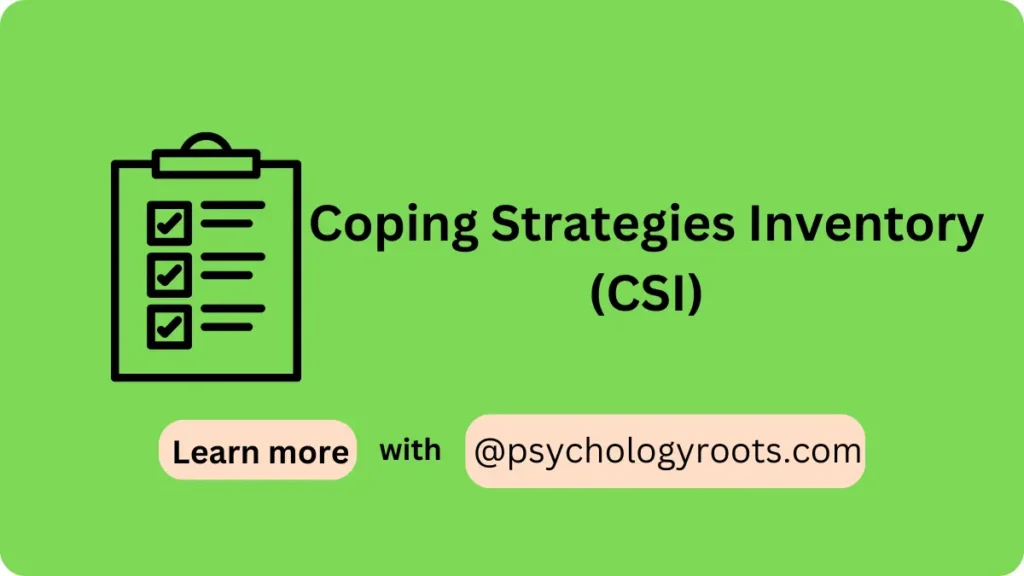Table of Contents
Coping Strategies Inventory
Here in this post, we are sharing the “Coping Strategies Inventory”. You can read psychometric and Author information. We have thousands of Scales and questionnaires in our collection (See Scales and Questionnaires). You can demand us any scale and questionnaires related to psychology through our community, and we will provide you with a short time. Keep visiting Psychology Roots.
About Coping Strategies Inventory
Scale Name
Coping Strategies Inventory
Author Details
David L. Tobin
Translation Availability
Not Sure

Background/Description
The Coping Strategies Inventory (CSI) is a comprehensive self-report measure designed to assess the coping strategies individuals use to manage stress and adversity. Developed by Daniel L. Tobin and colleagues, the CSI evaluates a wide range of coping mechanisms, including both adaptive and maladaptive strategies.
Coping strategies are essential in determining how individuals respond to stress, and understanding these strategies can inform treatment approaches, especially in psychological counseling and therapy. The CSI categorizes coping strategies into several domains, including problem-focused coping, emotion-focused coping, and avoidance strategies. Each domain includes specific subscales that measure different aspects of coping, such as seeking social support, cognitive restructuring, and behavioral disengagement.
The CSI is widely used in both clinical and research settings to evaluate the effectiveness of various coping strategies, identify areas where individuals may need support, and track changes in coping over time. It is applicable across different populations, including adults, adolescents, and specific patient groups.
Administration, Scoring and Interpretation
- Participant Selection: The CSI is appropriate for adults and adolescents who are experiencing stress or facing challenging situations. It is commonly used in therapeutic settings or as part of research studies.
- Scale Distribution: The inventory is typically administered as a self-report questionnaire, either in paper form or electronically. Participants respond to a series of statements that describe different ways of coping with stress.
- Response Format: Participants rate each item on a Likert scale, typically ranging from 1 (not at all) to 5 (very much), indicating how often they use a particular coping strategy in response to stress.
- Scoring: The CSI is divided into multiple subscales that correspond to different types of coping strategies. Scores are calculated for each subscale, as well as for broader domains like problem-focused coping and emotion-focused coping. High scores in adaptive coping strategies are generally associated with better psychological outcomes, while high scores in maladaptive strategies may indicate areas of concern.
Reliability and Validity
The Coping Strategies Inventory has been extensively validated across different populations and settings. It demonstrates strong internal consistency, with Cronbach’s alpha values typically exceeding 0.80 for most subscales.
The validity of the CSI is supported by its correlations with other established measures of coping and psychological well-being. Research has shown that the CSI effectively distinguishes between adaptive and maladaptive coping strategies, making it a valuable tool for both clinical assessment and research purposes.
Available Versions
72-Items
Reference
Tobin, D. L., Holroyd, K. A., Reynolds, R. V., & Wigal, J. K. (1989). The hierarchical factor structure of the Coping Strategies Inventory. Cognitive therapy and research, 13, 343-361.
Important Link
Scale File:
Frequently Asked Questions
Q: What is the Coping Strategies Inventory (CSI)?
A: The CSI is a self-report questionnaire designed to assess a wide range of coping strategies used to manage stress and adversity, including both adaptive and maladaptive mechanisms.
Q: Who can use the CSI?
A: The CSI is suitable for adults and adolescents experiencing stress or facing challenging situations. It is used by clinicians, researchers, and mental health professionals.
Q: How is the CSI scored?
A: The CSI is scored by calculating subscale scores for different coping strategies, which are then grouped into broader domains like problem-focused and emotion-focused coping.
Q: What is the difference between adaptive and maladaptive coping strategies?
A: Adaptive coping strategies, such as problem-solving and seeking social support, are associated with better psychological outcomes, while maladaptive strategies, like avoidance and denial, may exacerbate stress.
Q: How reliable is the CSI?
A: The CSI has demonstrated strong reliability and validity across various populations, making it a trusted tool for assessing coping strategies in both clinical and research settings.
Disclaimer
Please note that Psychology Roots does not have the right to grant permission for the use of any psychological scales or assessments listed on its website. To use any scale or assessment, you must obtain permission directly from the author or translator of the tool. Psychology Roots provides information about various tools and their administration procedures, but it is your responsibility to obtain proper permissions before using any scale or assessment. If you need further information about an author’s contact details, please submit a query to the Psychology Roots team.
Help Us Improve This Article
Have you discovered an inaccuracy? We put out great effort to give accurate and scientifically trustworthy information to our readers. Please notify us if you discover any typographical or grammatical errors.
Make a comment. We acknowledge and appreciate your efforts.
Share With Us
If you have any scale or any material related to psychology kindly share it with us at psychologyroots@gmail.com. We help others on behalf of you.